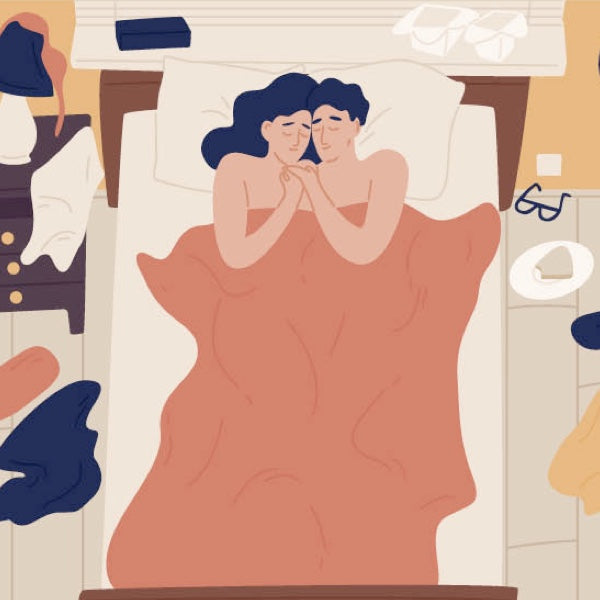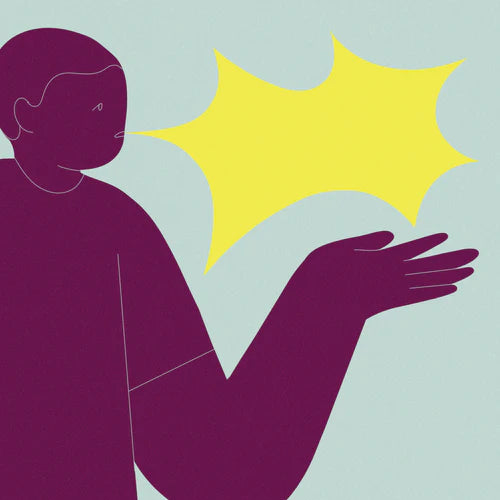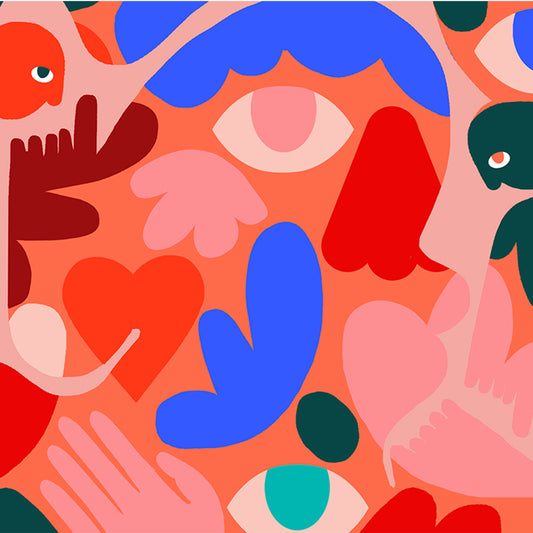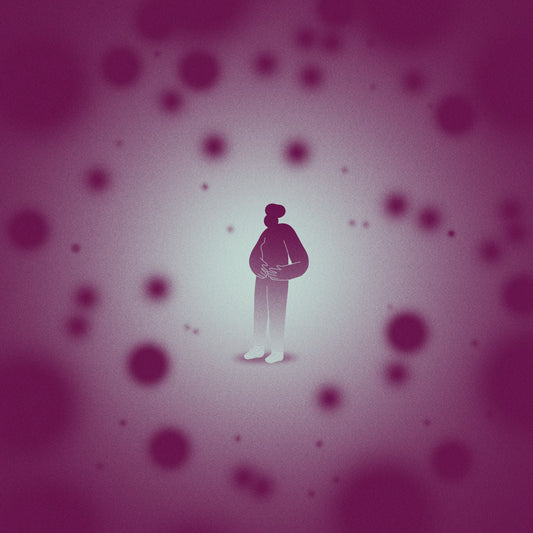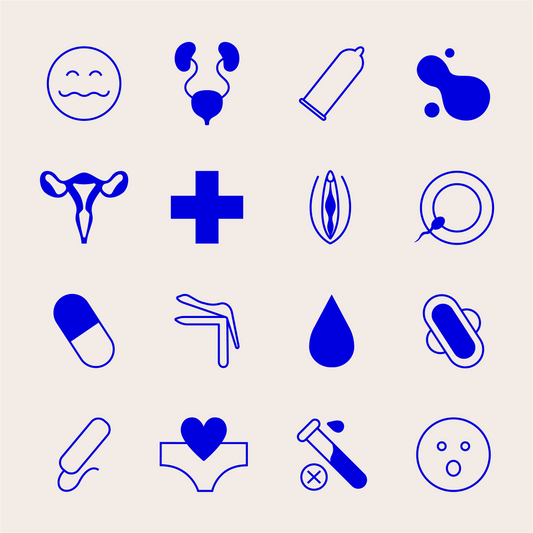Alexandra Fine, Credentialed Sexologist, M. Psych | Written by Dame
Causes | Can a Person’s Libido Really Be Too High? | Problematically High Libido | Symptoms | Treatment | High Libido Isn’t the Real Problem
We all have appetites.
No, that doesn’t only refer to an appetite for food – although eating is certainly an important physical drive that’s a joy for some and a problem for others.
The Merriam-Webster Dictionary defines appetite as “any of the instinctive desires necessary to keep up organic life.” And there’s no question that for nearly everyone, sex is an instinctive and necessary desire. (Asexuality is a different subject, which would take an entire article to delve into.)
Libido, the more polite name for sex drive, describes a person’s overall desire for sexual activity. As anyone who’s had more than a single partner knows, there’s no such thing as a “normal sex drive.” Some people simply want sex more than others. Some people have a naturally low libido; once a week, once a month, or even less often is just fine with them. Others may seem to be insatiable.
Then why does anyone even worry about low or high libidos? It’s because there are times that wanting very little sexual activity – or wanting a lot of it – can become a problem.
Most commonly, the issue arises when two partners have very different levels of sexual desire. However, there are times when a person’s sex drive increases or declines for no apparent reason – and that can be an indication of a deeper issue which needs attention.
When you’re young, energetic, (and pardon the expression, horny), you might think that having a very high libido couldn’t possibly be a problem.
But it can. Let’s learn more about what causes an unnaturally high sex drive, when it needs to be addressed, and how it can be treated.
What Causes Low or High Libido?
A complicated mix of intertwined factors determines every person’s level of sexual desire.
The three most important are physiological factors like hormone levels, and overall health and wellness; psychological factors like depression and anxiety; and sociological factors like relationship status and lifestyle. Other factors like genetics also play a role, but let’s focus on the “big three.”
Physiological Factors
Hormones
The three primary sex hormones in the human body are testosterone, estrogen and progesterone.
Testosterone is the hormone largely responsible for the development of sex organs and gender-specific body characteristics in penis-havers, their production of sperm – and their libidos. Progesterone and estrogen (and another form of estrogen, estradiol) are also involved, but what doctors call “male testosterone levels” are a key ingredient in a penis owner’s sex drive.
You might think of vulva-havers’ hormones as performing the opposite way. Estrogen plays a major role in the development of sex organs and characteristics, and in combination with progesterone (and testosterone, to a lesser extent), they regulate “female sexual health” and the reproductive cycle. Those two hormones are also major factors in vulva owners’ libidos.
The roles of hormones may seem to be mirror images in the genders, but the way their levels rise and fall are very different.
Testosterone levels in those with penises will normally be highest during puberty and through the teenage years; that’s when the hormone is doing the most “work,” so more of it is needed. Sometime between age 30 and 40 testosterone production slows down, and penis-havers will lose 1-2% of their testosterone each year after that. As you’d expect, that means their libidos are normally at their highest during the teens and 20s, and then start to decline.
Hormone levels in vulva-havers vary quite differently, because estrogen and progesterone play an integral role in the menstrual cycle.
As the body approaches ovulation, estrogen is needed to prepare the uterus to support a fertilized egg. Some also believe that the release of estrogen – causing a higher sex drive – is designed to encourage sex and reproduction when the body is most fertile.
By contrast, estrogen levels fall and progesterone levels rise during menstruation. That’s because progesterone helps to promote the growth of an embryo, if a fertilized egg has been implanted. Progesterone also causes the side effects known as PMS like fatigue, headaches and bloating – all reasons why a vulva owner may not desire sex at this stage of the cycle.
In other words, vulva-havers experience regular fluctuations in their hormone levels every month, until they go through menopause. That’s when their estrogen levels permanently decrease, and they are likely to have a significantly lower libido (not to mention issues like vaginal dryness).
This also explains why people may experience a lower-than-normal sex drive when using hormonal birth control methods like the pill. Those contraception methods “smooth out” hormone levels and prevent a monthly surge in estrogen.
Hormones like serotonin and oxytocin, and neurotransmitters like dopamine and norepinephrine, also play roles in determining libido.
The key takeaway here, though, is that vulva-havers must understand how their cycle affects their sex drive, and both genders must understand the ways that their libido naturally falls with age. That allows them to determine their “baseline” levels of libido – that is, what’s normal for them – before concluding that they’re experiencing unusually high or low sex drive.
Other Physiological Factors
A number of diseases and medical conditions, including but not limited to heart disease, diabetes, high blood pressure, obesity and cancer, can also affect hormone levels and lower libido. When treatments for those issues work successfully, they may also cause what seems to be an increased sex drive.
Similarly, discontinuing medications whose side effects include lower sexual desire (such as antidepressants like SSRIs and blood pressure medications) can make it appear that sex drive has unexpectedly soared.
In most of these cases, medical advice should be sought from the doctor or health professional responsible for treating the underlying health issues. They can make the appropriate referral to a mental health specialist if necessary.
Psychological and Sociological Factors
Mental health issues like depression, stress and anxiety are well-known to cause low sexual desire, as are low self-esteem, poor body issue, feelings of shame surrounding sexual behaviors or sexual activity, and concerns over sexual dysfunction issues like erectile dysfunction. Vulva-havers may also experience what’s known as hypoactive sexual desire disorder (HSSD), a long-term lack of sexual desire.
Successful treatment of those problems with therapy or medication may inadvertently lead to an increased libido – even if the issue of low sexual arousal was never recognized or discussed.
A number of lifestyle issues can be responsible for low sex drive as well. There are a large number of possibilities: relationship problems, schedules too busy to accommodate a robust sex life, lack of exercise and proper diet, too little sleep, smoking and drug use. “Fixing” the relationship or time management issues, or living a healthier lifestyle, may be difficult. But putting in the work may also increase libido.
That’s a lot of detail, but it doesn’t require a Ph.D. to understand the less complicated equation. Better mental and physical health and being in a healthy relationship makes people happy, and happier people are more likely to have a healthy sex drive.
Can a Person’s Libido Really Be Too High?
Absolutely – when it interferes with normal daily functioning.
A very high libido may lead to – among other things – very frequent, consensual sexual activity with a partner or partners, very frequent sexual fantasies, and frequent masturbation. Those aren’t necessarily problematic, but there’s a red line.
When a preoccupation with sexual urges, fantasies or behaviors can’t be controlled, causes psychological distress, negatively affects everyday life or threatens to cause physical harm, there’s a name for the issue: compulsive sexual behavior, or sex addiction. Most experts also call it hypersexuality, although a few use that name only for very high libido that doesn’t cause problems in personal life.
Compulsive sexual behavior can take many forms and encompass many different types of sexual activity. But however it manifests, it’s classified as an impulse-control disorder in the International Classification of Diseases, and it should be treated.
What Can Cause a Problematically High Libido?
We’ve discussed the important role of hormones and neurotransmitters in determining a person’s libido. There’s no evidence linking hormone levels to hypersexuality, but an imbalance in neurotransmitters like dopamine, serotonin and norepinephrine has been shown to correlate with development of compulsive sexual behavior. Those neurotransmitters are responsible for, among other things, the regulation of mood and impulses in the brain.
It’s also theorized that compulsive sexual behavior can cause changes in the brain’s neural circuits, just as other addictions do. That could mean an intensification of sexual behaviors over time, as the brain requires additional stimulation in order to experience satisfaction.
Finally, there are some types of neurological conditions and medications that may affect the brain and damage the areas that regulate sexual behavior. Epilepsy and dementia are suspected to be two possible culprits; drugs that are “dopamine agonists” and used to treat conditions as varied as Parkinson’s disease and restless leg syndrome may also be responsible for the lack of impulse control that leads to hypersexuality.
There’s no evidence to explain causality, but studies have found that the risk of compulsive sexual behavior is higher in those who have other addiction issues, mood disorders including depression, and histories of abuse or traumatic family situations or conflicts.
Symptoms of a Problematically High Libido
An issue like hypersexuality, which is still quite controversial in many mental health circles, is diagnosed anecdotally rather than rigorously. The symptoms, if they last six months or longer, may include:
- Sexual behaviors which regularly interfere with obligations and normal activities.
- Recurring and intense sexual urges, fantasies and/or behaviors.
- Inability to control or lessen those urges, fantasies and/or behaviors, despite repeated attempts.
- Lying to cover up problematic sexual behavior related to compulsions.
- Links between those behaviors and mood issues like depression, anxiety or boredom.
- Feelings of remorse or significant mental distress which are regularly caused by the behaviors.
- Participation in sexual experiences and activities despite the possibility of emotional or physical harm to the patient or to others.
Compulsive sexual behavior caused by an abnormally high libido often goes undiagnosed or untreated until it results in serious medical problems like worsening depression or contraction of sexually transmitted diseases; major family issues, relationship difficulties, or inability to engage in sexual activity with a regular partner; or public consequences such as job loss, financial hardship or arrest.
Professionals may be able to help with the problem, though, before it reaches those points.
Treatment for a Problematically High Libido
Since compulsive sexual behavior has only been an internationally-recognized mental disorder for less than a decade, and the U.S. DSM-5 (Diagnostic and Statistic Manual of Mental Disorders) still doesn’t recognize it, treatment for hypersexuality is still in its infancy.
A psychiatrist, psychotherapist or certified sex therapist (CST) is best suited to help with sex addiction. Cognitive therapy may be tried as a way to change behaviors, and some physicians may prescribe antidepressants in order to lessen dangerous urges or relieve one of the potential causes of compulsive sex disorders.
Other approaches can include developing strategies to manage stress or depression that may lead to hypersexuality; identifying and mitigating possible triggers for compulsive sexual thoughts and behaviors; identifying acceptable substitute behaviors which might substitute for the problematic ones; and rebuilding relationships which have been damaged by the behaviors.
Inpatient sex addiction programs and 12-step programs like Sex Addicts Anonymous are also possible avenues for treatment and behavior modification, but they are too new for their success rates to be judged.
High Libido Isn’t the Real Problem
If there’s one takeaway from this discussion, it should be this: having a high libido isn’t a problem in and of itself, and it doesn’t necessarily need to be addressed. Many people have a low sex drive, and many others have a high sex drive. As long as a high level of sexual arousal and a frequent desire for sexual activity doesn’t cause any issues or distress, there’s no cause for concern.
Similarly, there’s nothing “wrong” with partners who have mismatched libidos. Many couples are able to find alternative approaches to their sexual needs which can help compensate for the difference in sexual appetites, either on their own or with the help of sex therapy or couples counseling. Some, of course, may end up finding that they’re not compatible and have to split up – but again, that’s not a “high libido issue” which requires professional medical treatment.
When an extremely high sex drive leads to some of the mental distress, relationship or other real life issues we’ve discussed, however, that’s not just a high libido. It’s compulsive sexual behavior, and a mental health or addiction specialist should be consulted as soon as the problem becomes apparent.
